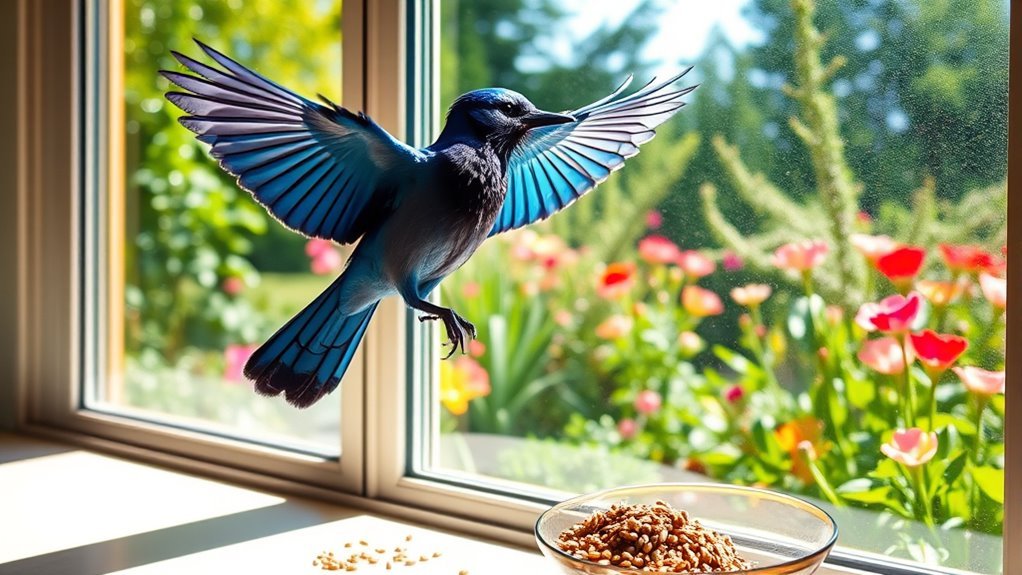Why Does This Bird Keep Attacking My Window?
If a bird keeps attacking your window, it is likely seeing its own reflection. During mating season, birds view their reflection as other birds entering their territory. This behavior is instinctual and can pose risks to the bird's safety.
To deter the bird from pecking at your window, consider these effective methods:
- Use Window Decals: Place decals or stickers on your window. These break up the reflection and help the bird recognize it as a barrier.
- Hang Ribbons or String: Attach reflective ribbons or strings near the window. They can confuse the bird and reduce its urge to attack.
- Apply Window Screens: Installing screens can lessen the reflection and create a physical barrier between the bird and its reflection.
- Close Blinds or Curtains: Keeping blinds or curtains closed, especially during peak times, can prevent the bird from seeing its reflection.
- Move Bird Feeders: If you have bird feeders close to the window, relocating them can help reduce the bird's interest in the reflection.
By understanding the behavior and using these solutions, you can minimize the bird's window attacks and keep both the bird and your window safe.
Key Takeaways
- Birds attack windows primarily due to territorial instincts, mistaking their reflection for an intruder during mating season.
- The clear nature of glass allows birds to see their reflection, triggering aggressive behavior.
- Alarm calls and displays are used by birds to assert dominance and defend their territory.
- Aggressive behaviors may increase when a bird perceives a rival near its nesting area.
- Solutions like window decals, cleaning, and physical barriers can help deter birds from attacking windows.
Understanding Bird Behavior

Birds may attack your window for several reasons. This behavior usually relates to their instincts for defending territory or during mating season. When a bird sees its reflection, it may think it's another bird intruding. This leads to an aggressive response as the bird tries to protect its space.
Birds communicate through alarm calls to warn each other of threats. An alone bird may feel a strong need to show dominance against what it believes is a rival. This action is part of how they interact and protect their community.
Watching this behavior can help you appreciate birds and their connection to nature. Understanding why they act this way enhances your experience of being in nature.
The Role of Reflections
Reflections can greatly affect a bird's behavior. When birds see glass, they often mistake their reflection for another bird. The clear nature of glass allows them to notice their own image or the scenery behind them, causing confusion.
This confusion can trigger aggressive behavior, especially during breeding seasons when they defend their territory. They view their reflection as a rival and may repeatedly attack the window. Understanding this behavior can explain why birds act this way and stress the importance of solutions like window decals or screens.
These methods reduce glass visibility and help prevent these encounters. Recognizing this behavior encourages a connection with nature and highlights the need to protect these birds.
Territorial Displays

Birds show territorial displays to assert dominance and defend their breeding areas. You may see them acting aggressively by pecking at windows or making loud noises. These actions come from territorial aggression, which is a key part of bird communication.
When a bird sees its reflection, it thinks it sees a rival, leading to defensive actions to protect its space. The bird might flap its wings or perform display flights to scare off the perceived attacker, demonstrating its strength.
Understanding these behaviors helps us appreciate birds as they protect their territory and communicate their needs.
Mating Season and Nesting
As mating season begins, birds focus on finding and defending nesting sites. You might see them display vibrant feathers and perform unique songs to attract mates.
During this time, they gather materials like twigs, leaves, and grasses to build a cozy space for their eggs.
If a bird sees its reflection in your window, it may think another bird is intruding and may act aggressively to defend its territory. This behavior is common if your window is near their nesting area.
Recognizing these natural activities can help you appreciate the energy birds display during this important time.
Tips for Deterring Window Pecking

Window pecking by birds can be annoying, especially during mating season. To reduce this behavior, you can use some simple bird-proofing methods.
First, apply window films. These films create a barrier that helps birds see the glass as a wall, not an opening.
Next, hang lightweight decorations such as reflective tape or wind chimes outside your window. These can distract birds and keep them away.
You can also plant shrubs or set up barriers outside to create physical obstacles for the birds.
Regularly cleaning your windows will remove reflections that might confuse them.
Frequently Asked Questions
Can Certain Bird Species Be More Aggressive Towards Windows?
Certain bird species show aggression towards windows because of reflections. They see their own reflection as a rival or intruder. This behavior often happens during the breeding season, as their territorial instincts kick in. The intensity of this behavior can differ among species.
Do Season Changes Affect Bird Window Attacks?
Season changes influence bird window attacks because of changes in their migration and breeding habits. When birds migrate or establish their breeding areas, they often become more aggressive. This aggression can lead to increased attacks on reflective surfaces, such as windows, during these periods. Observing these patterns can help in understanding bird behavior and taking steps to reduce window collisions.
Is the Frequency of Attacks Influenced by Weather Conditions?
Yes, weather can affect bird behavior, including how often they hit windows. Changes in temperature, wind, and rain can influence their feeding habits and territorial behaviors. As a result, window attacks might increase during specific weather conditions.
What Time of Day Are Window Attacks Most Common?
Morning attacks by birds at windows are more common. This occurs because many birds are active in the morning as they establish their territory. In the evening, birds show increased aggression while they prepare for nesting, which also leads to more window strikes.
Do Birds Ever Stop Attacking Windows on Their Own?
Yes, birds can stop attacking windows on their own. They often learn that their reflections are not threats. This change shows how birds adapt to their surroundings and adjust their behavior over time. By recognizing the reflections, they can reduce or stop their aggressive actions toward windows.

Hello, I’m Amelia White, the founder of birdsfanatic.com. As a lifelong bird enthusiast and spiritual seeker, I’ve always been fascinated by the mystical connections between birds and the human experience. On this site, I share my knowledge and insights into the symbolic meanings and spiritual significance of various bird species, exploring their roles in mythology, folklore, and cultural traditions. Join me on this journey into the world of birds, where we’ll discover the hidden wisdom and guidance that these magnificent creatures have to offer.







